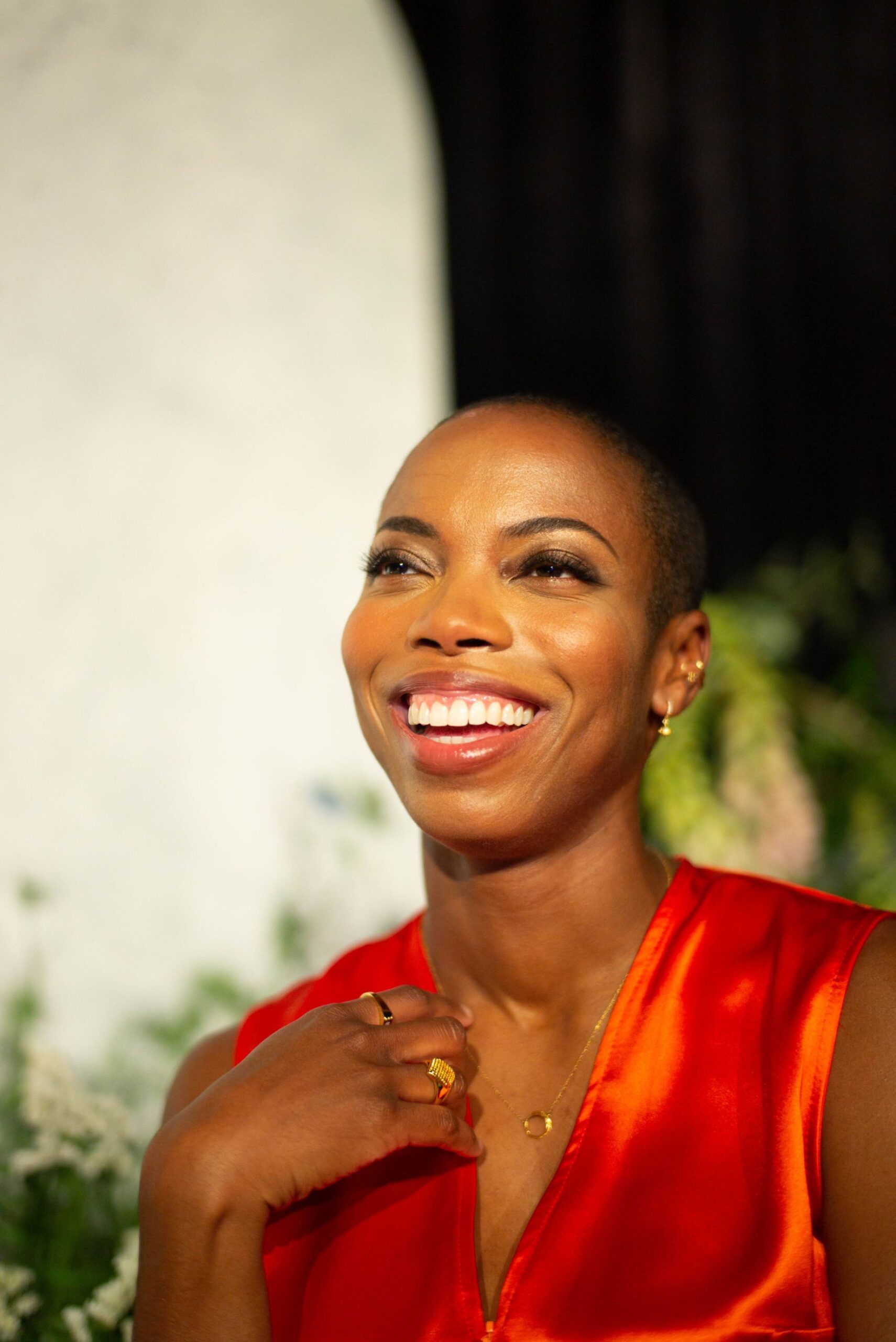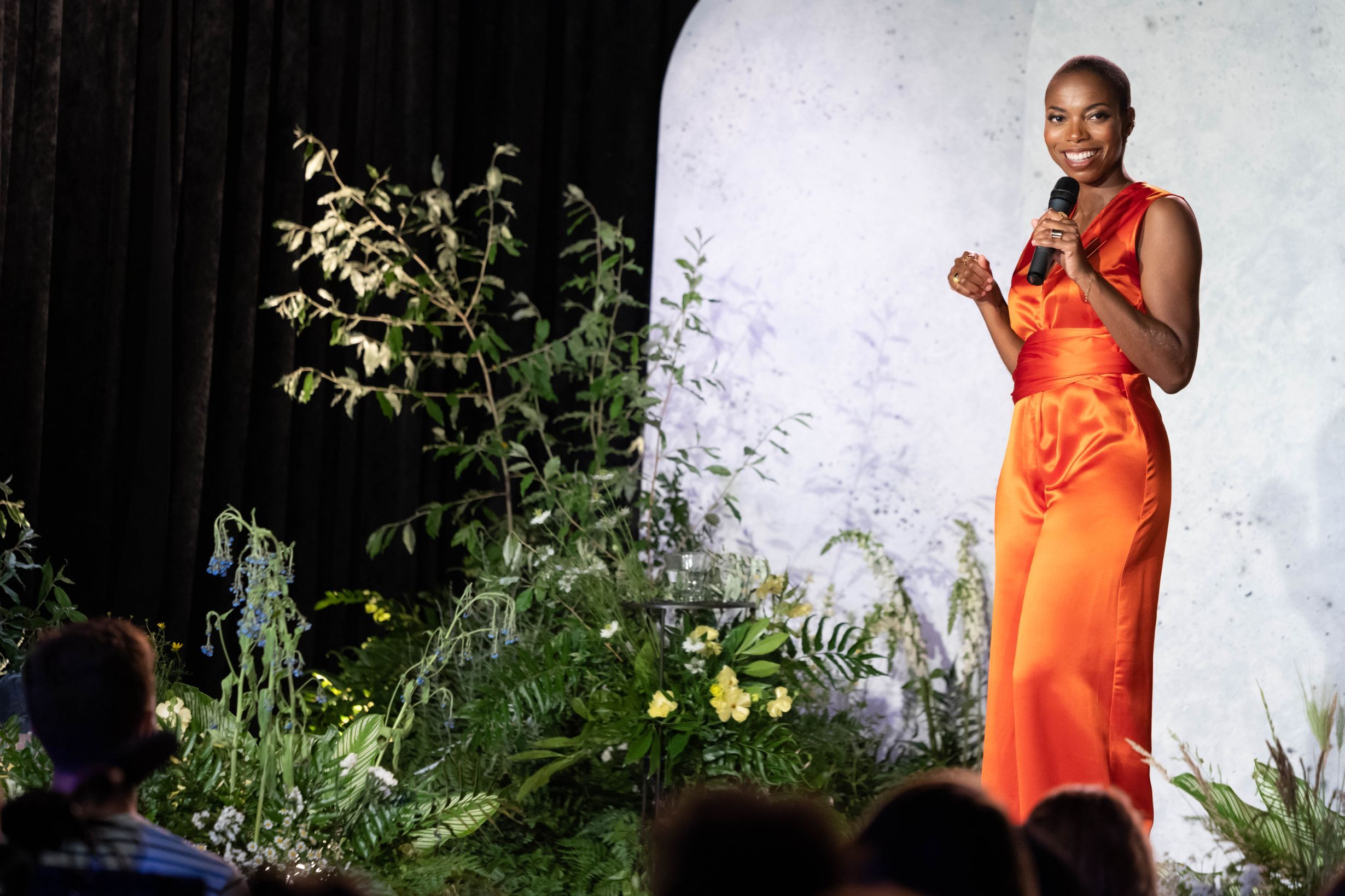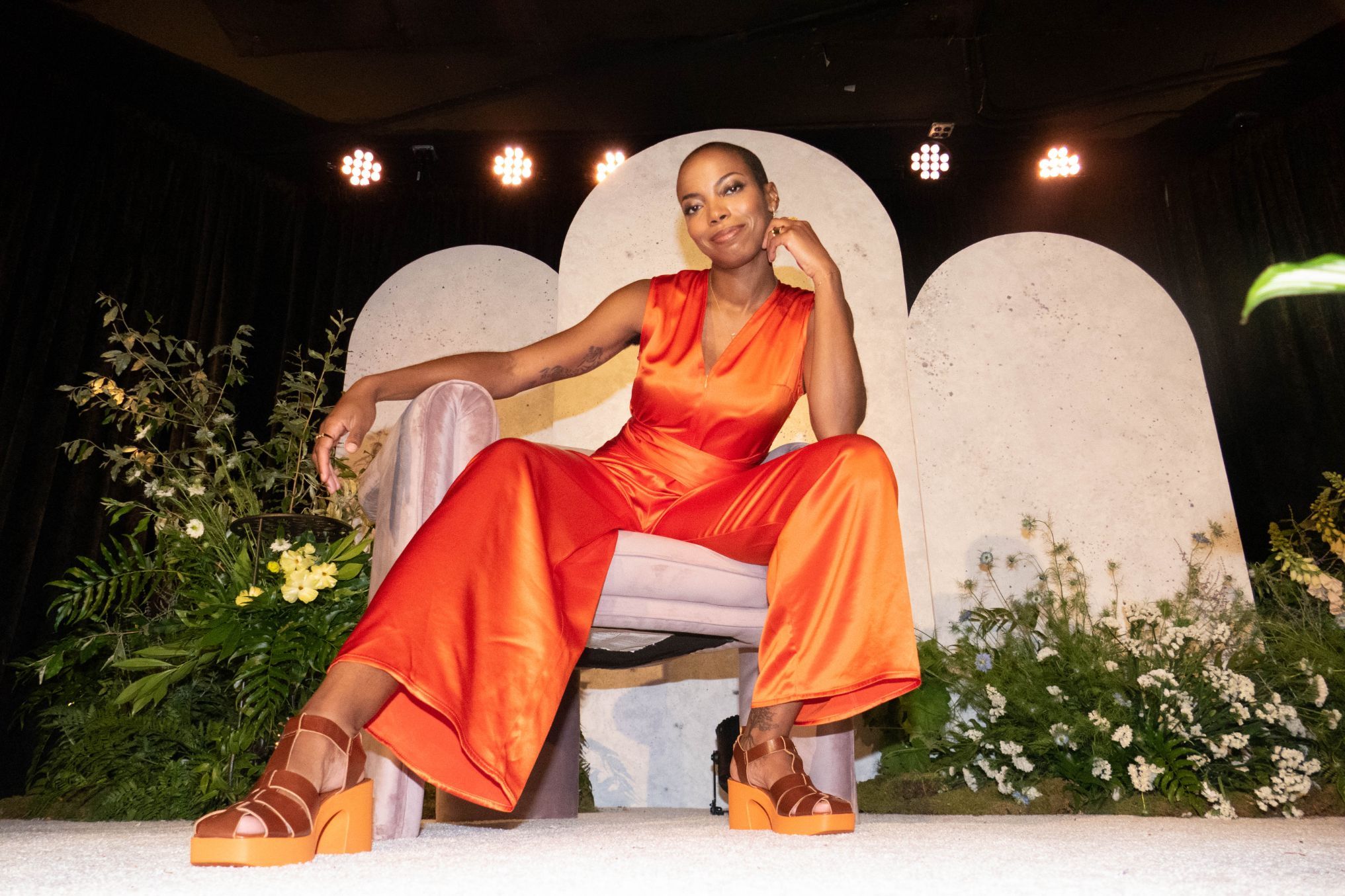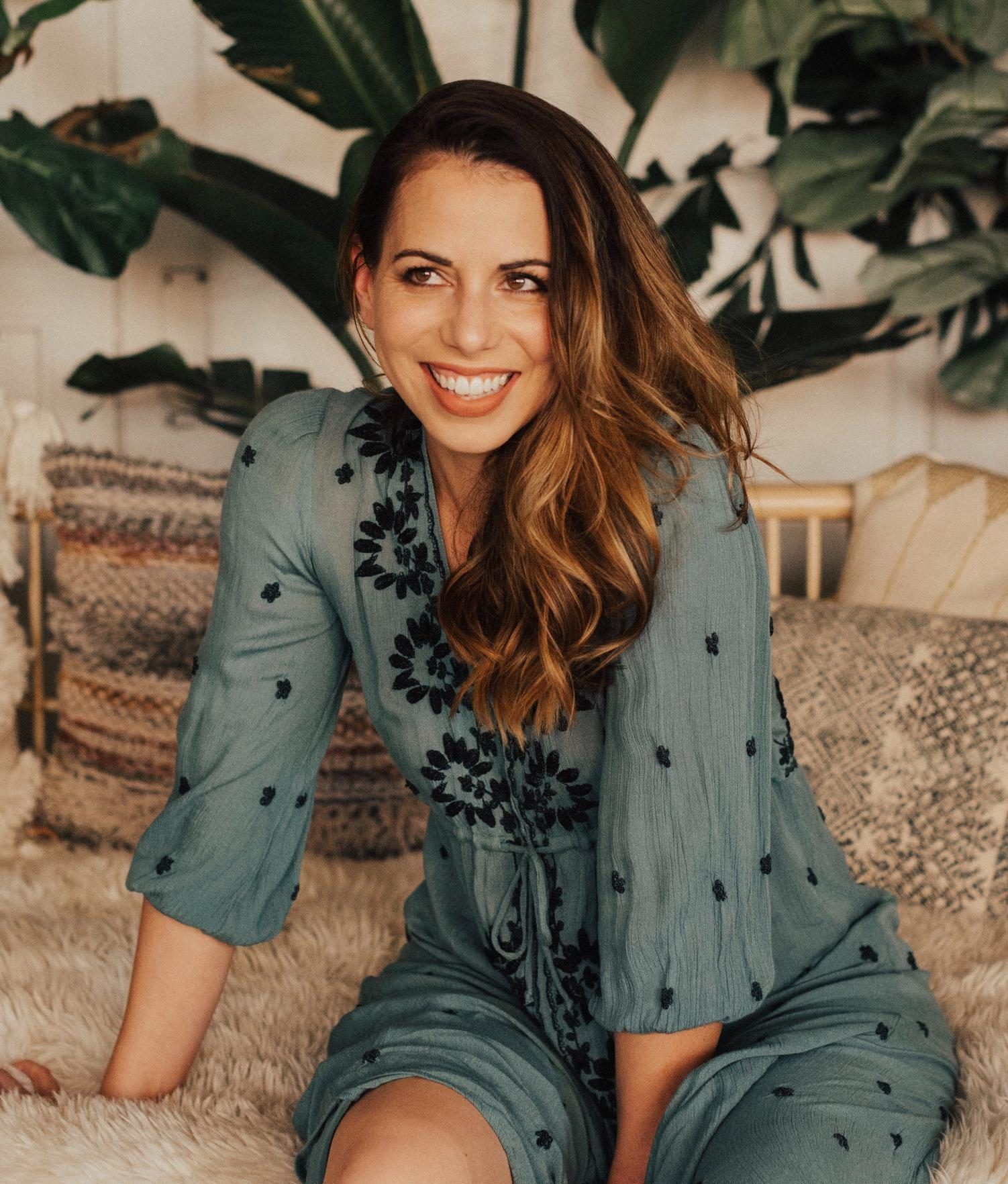
Sasheer Zamata
Comedian and actress Sasheer Zamata’s The First Woman is an unfiltered look at what is to be a woman today.
Citing the likes of Carroll Burnett, Whoopi Goldberg, Lucille Ball, and Wanda Sykes as her inspiration, Sasheer Zamata has had a constant and unadulterated love for comedy. From the early days of Saturday Night Live to Whose Line is it Anyway? Zamata knew she wanted to be a part of that world. So, after moving to New York City, she enrolled in improv classes, and to her surprise, that decision led her down the path she’s on today. Fast forward to 2023, and her second comedy special, The First Woman is released on 800 Pound Gorilla and YouTube. With all the knowledge accrued over the years in the entertainment industry, Zamata takes pride that this special is the first over which she’s had full creative control and ownership. In her eyes, it was a radical move for her to have that freedom. To be able to produce art in the way that she wants.
Turning inward during the pandemic, Sasheer was thriving. While her profession may be of an extroverted nature, she was truly having the time of her life, creating art, and taking the time to rediscover herself. The input serves the output as she penned a special that she hopes everyone can find a relatable thread. Whether your ideals align or not, no matter your demographic, the hope of The First Woman is that you come out on the other side having learned something from a different perspective.
In conversation with 1883 Magazine’s Dana Reboe, Sasheer discusses her love of comedy, the need to focus inward, how she coped during the pandemic and so much more!
So, to jump into it, let’s start with The First Woman. I loved how unfiltered, unapologetic, and raw it was. What is your hope for people watching?
I hope people watch it and just really enjoy it. I hope people have fun watching it. I hope they laugh a lot. I hope they relate to it. I hope it starts conversations with people in their lives. I just want people to consume it in a way that feels I don’t know, fulfilling it in some sort of way.
What was your thought process behind putting the special together? Did you conceptualize it during the pandemic? How did it come to be?
I did start thinking about it during the pandemic. Some of the material I had before and some of it is very new. It’s a mixture of those things, but I wanted to release new material. The last special I released was in 2017. I have grown as a performer and as a person. Things have happened in the world that has changed us all, and I felt like I was ready to give people new stuff [laughter].

How would you say the pandemic changed you creatively?
I turned more inward during the pandemic. A lot more therapy, a lot more self-reflection self-analyzation which comes out in my work, and you know, that’s kind of what stand-up is. It’s like you reflecting yourself to an audience. And I guess reflecting on the world around you. I do feel like I have a better understanding of my personhood. I think people can relate to that because they were doing the same thing I was doing while they were cooped up in their house – thinking about what’s going on with me.
Do you consider yourself to be an introverted extrovert?
I consider myself to be an extroverted introvert [laughs]. I think I’m an introvert at my core. But I do have extrovert qualities. I can perform, I can stay in front of people, but I’m dying to go home at a moment’s notice.
I’m exactly the same way. After hanging out with friends for a few hours. I’m like, ‘I’m good.’ Have to recharge that social battery.
Yeah, absolutely. You have to acknowledge the social battery.
How were you coping at home? Was the extrovert part of you going crazy?
I was thriving. I was doing great. It was the best, that’s all I wanted to do anyways – stay home. I was like, ‘Oh, we all get to do this, and I don’t have FOMO and I don’t have to lie to people when I’m telling them I can’t hang out tonight? Because we literally can’t hang out?’ Thank goodness.
Circling back to The First Woman, it’s so refreshing to see a black woman speak openly and confidently about her body. What was that journey of self-acceptance like for you?
I don’t know if there was a time when I never accepted my body. I’ve always enjoyed being in my skin and being in my body. I like talking about it because it’s my truth. I have been labeled as a political comedian for most of my career. Because the things I’m talking about are: being black, being a black woman, and being a black woman in America. Those things can be political. But I never aim to be political. I never aim to give a message or anything like that. The things I talked about are truly from personal experience or my life so I hope people can relate to that in some way. Either if you’re the demographic that I am or even if you’re not, maybe you can learn something. If you’re talking from a place of truth, and from a place of knowledge of yourself, I think anyone can relate to that.
I love that answer. Whether the art is made directly for us or not, there’s always a relatable thread. Take me through putting The First Woman together. How did it feel to step back into stand-up?
This was the first special I self-produced. The first one I put money into, and I have ownership of and it feels so good. It felt different because I really got to think about the whys of the production like, ‘Why are we doing this, why are we spending this much money on X, Y, and Z? Why are we not spending money on this x y and z?’ I really loved having more knowledge about what I wanted. It was very important for me to have ownership of my material and my work. I’ve had moments in the past where I didn’t have that, so The First Woman is radical for me in a lot of ways because it’s a way for me to put my art out directly to the people and feel like it’s mine. It just feels deeper and more emotional and rawer than the first special I did. This special feels like it’s reaching a new depth because I myself am able to go there.
Amazing. How did it feel to see audiences resonating and reacting so viscerally?
I always feel so great. I mean, anytime I perform, and people can come up to me and say, ‘Oh, I related to this because of this story or I have never experienced that before but I understand what you’re saying.’ I love that. I love it when people can do that. Or even if they’re like ‘I don’t relate, but boy did I learn a lot.’ I appreciate that too. I did a show in DC and this man came to me after the show and he was like, ‘I voted for Trump.’ What an intro. Okay. Where are we going from here? And he was like, ‘I had no idea who you were. I just came to a comedy show. And I got to say I felt so welcome. I felt like I understood everything you were saying and maybe if I had known any of your stuff beforehand, I wouldn’t have come but I’m glad I came blindly. I feel like I was able to relate to you even though we probably don’t agree on a lot of stuff.’ I still appreciate that. I’m glad he was able to come and still appreciate the work because he probably could relate to a human experience and that’s what I want.

Kudos to anybody who still has an open mind even when the ideals of the thing they’re watching, reading, etc. don’t necessarily align. That’s all you ask for right when somebody’s absorbing your art. Switching it up a little. Have you always wanted to be an actress and a comedian? Was that always the plan?
When I was really little, I wanted to be a pop star [laughs]. I wanted to be a singer and tour and whatnot. I still sing occasionally. I’ve been asked here and there during work to sing, which is nice. I really want to be a pop star. But eventually, I was intrigued by comedy. I was always a comedy fan. I watched SNL (Saturday Night Live), Late Night with Conan O’Brien, Whose Line Is It Anyway? I loved comedy, but I had no idea how anyone got into it. I didn’t even think it was a thing that I could do. I didn’t think it was a goal I could attain. But when I moved to New York, I started doing improv and sketch and stand-up purely because I thought it was fun. I was like, like, ‘Oh, I should probably get to try this. I love it so much.’ I tried it and I loved it. Then I started getting jobs from it. My agent saw me on stage, my manager saw me on stage. I started getting cast in commercials and other things. So yeah, I think following things that felt good to me, ended up putting me on the path I wanted to be on in the first place.
And what about comedy do love so much? Who were your inspirations?
I love that comedy can help bring people together. I feel like if you’re in a room full of people laughing at the same thing, it feels very unifying. Even if you look around and you feel like you’re different from the people who are around you, you can find some sort of common ground if you can laugh at the same thing. And influences I’ve had are Wanda Sykes, Whoopi Goldberg, Sarah Silverman, Carol Burnett, and Lucille Ball. I love people who could be silly but also have a bite to them if you will.
All of them have an edge, I love that. So sharp and quick-witted, too. None of them miss a beat. So then, I have to ask: what is a piece of advice you’d give your younger self knowing everything you do now?
Probably chill out [laughter]. It’s not that serious. You know, you’re going to make mistakes and you should make mistakes because that’s how you learn. And you don’t have to try to make everything perfect or pristine the first time you try because no one is perfect. That’s what I would tell a little six-year-old me.
Let’s talk about your work with the ACLU (American Civil Liberties Union). What does it mean to be you to be part of that organization? How did you get involved?
They approached me in 2014. I was new to SNL and I think they had seen my stand-up and thought that my values aligned with the work they were doing, which was a huge compliment. They wanted to partner with people who could help spread the word about what they were working on. I helped them put sketches together. I wrote essays for them. I’ve done speeches for them. And it’s nice because I get to help spread the word about what’s happening in the women’s rights project through comedy, which I think is a more digestible form of receiving information. I bring my audience to them and then their audience comes to me. It works well. I hope people have stumbled upon a video or two of mine I’ve done for them and learned something from it or spread it to others like, ‘Oh, did you notice what’s happening? Or did you know we can help by doing X, Y and Z?’ Hopefully some change can happen.
You said in an interview with The Cut the advice you’d give young people who want to get into the industry is to write and create and do as much of that as possible. In those moments when you struggle to create, how do you find your flow again?
You know, I finished this special, and I put all this work into it. My brain is empty. I’m wrung dry. And that’s how I felt after my first special. I dumped all this energy into this project. Then I was like, ‘Am I ever going to be funny again? Do I know what funny is? Do I know a joke?’ But I had to remind myself: I have the skill. I already have the experience that will get me to a point where I have the material and then I’m not sure how many months it was after I filmed my special but eventually, I started writing jokes again, and it came back to me. I don’t think it would have felt good or natural or cohesive if I forced anything. I needed things to come to me. I need to live life because what I’m talking about in my standup is my life. If I don’t live, I don’t have anything to talk about. I think being open and observant will put you in a really good place to receive ideas or thoughts that will lead you on a path to create again. And then, of course, there are exercises, write three pages every day and something can come about from it. But also, don’t beat yourself up. Sometimes brains are tired. They just need to rest.
What is a major lesson you’ve learned about yourself throughout the course of your career? And what is a lesson you’ve learned about the industry?
I’ve learned that whenever I get a ‘no,’ it’s very possible to turn it into something else. I like using those moments as an opportunity. For example, the special – I shopped it around before I shot anything to see if anyone would buy it. And people were like, ‘Oh, we have too many or we’re not buying specials now, or whatever.’ And then I said, ‘Oh, I can make it myself. No one’s stopping me from doing that.’ I have the resources. I can do it. And so, I did it and I’m so happy I went that route. Because I got to control it. You know, I could have just waited until someone said yes, but that sucks. You’re allowed to do the thing and make thing.
And lastly, what is something you would like to manifest for yourself this year?
Joy. I just want to do things that make me feel good. Make me feel happy. Make me feel healthy. I’m looking forward to kind of going inward again. I’ve been very fortunate that I’ve had work back-to-back for the last few years, where I go from show to show. It’s so wonderful. But now I get to take time and be ‘Okay, well, well, who am I? If I’m not on a show?’ I’m currently taking some directing classes, which is really exciting. I’m going into input mode during the strikes. It’s an exciting time, it’s also, you know, again, a stressful time. But it’s a time when I can go inward again. And that will only help with the out-put for the next thing.
Interview Dana Reboe
Photography Miles Bitton





